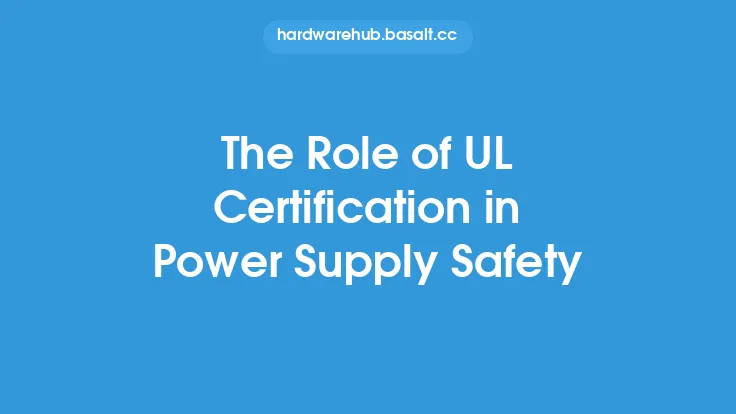In the realm of power supply manufacturing, quality and reliability are paramount. One of the most widely recognized and respected standards for ensuring quality management is the ISO 9001 certification. This international standard, published by the International Organization for Standardization (ISO), outlines the requirements for a quality management system (QMS) that organizations must follow to demonstrate their ability to consistently provide products that meet customer and regulatory requirements. For power supply manufacturers, achieving ISO 9001 certification is a significant milestone that can have a profound impact on their operations, reputation, and bottom line.
What is ISO 9001 Certification?
ISO 9001 is a generic standard that can be applied to any organization, regardless of its size or industry. The standard is based on several quality management principles, including a strong customer focus, the involvement of top management, a process approach, and continuous improvement. To achieve ISO 9001 certification, an organization must demonstrate its ability to implement and maintain a QMS that meets the standard's requirements. This involves establishing a set of policies, procedures, and controls that ensure the consistent production of high-quality products.
Benefits of ISO 9001 Certification for Power Supply Manufacturers
For power supply manufacturers, the benefits of ISO 9001 certification are numerous. One of the most significant advantages is the improved quality and reliability of their products. By implementing a QMS that meets the ISO 9001 standard, manufacturers can reduce the risk of defects and errors, resulting in fewer warranty claims and product returns. This, in turn, can lead to significant cost savings and improved customer satisfaction. Additionally, ISO 9001 certification can enhance a manufacturer's reputation and credibility, making it more attractive to customers and business partners.
Key Requirements of ISO 9001 Certification
To achieve ISO 9001 certification, power supply manufacturers must meet several key requirements. These include establishing a QMS that outlines the organization's quality policies, objectives, and procedures. The QMS must also include a set of processes and controls that ensure the consistent production of high-quality products, including design and development, production, and testing. Manufacturers must also establish a system for monitoring and measuring product quality, as well as a process for continuous improvement. Furthermore, the QMS must be regularly reviewed and updated to ensure that it remains effective and aligned with the organization's goals and objectives.
The Certification Process
The process of achieving ISO 9001 certification involves several steps. First, the organization must develop and implement a QMS that meets the standard's requirements. This typically involves establishing a quality management team, defining quality policies and objectives, and developing procedures and controls for ensuring product quality. Next, the organization must conduct an internal audit to ensure that its QMS is effective and compliant with the standard. The organization must then invite an independent auditor to conduct a certification audit, which involves a thorough review of the QMS and its implementation. If the audit is successful, the organization will be awarded ISO 9001 certification, which is typically valid for three years.
Maintaining Certification
To maintain ISO 9001 certification, power supply manufacturers must undergo regular surveillance audits, which are typically conducted every 12 months. These audits involve a review of the organization's QMS and its implementation, as well as an assessment of the organization's ongoing compliance with the standard. Manufacturers must also continue to demonstrate their commitment to continuous improvement, by regularly reviewing and updating their QMS and implementing changes to improve product quality and customer satisfaction.
Technical Requirements for Power Supply Manufacturers
In addition to the general requirements of the ISO 9001 standard, power supply manufacturers must also meet specific technical requirements related to the design, production, and testing of power supplies. These requirements include ensuring that products meet relevant safety and performance standards, such as those related to electromagnetic compatibility (EMC), safety, and efficiency. Manufacturers must also establish procedures for testing and validating product performance, as well as for ensuring that products are properly labeled and documented.
Industry Recognition and Acceptance
ISO 9001 certification is widely recognized and accepted across the power supply industry, as well as in other sectors. Many customers, including original equipment manufacturers (OEMs) and contract manufacturers, require their suppliers to have ISO 9001 certification as a condition of doing business. Additionally, many industry associations and regulatory bodies recognize ISO 9001 certification as a key indicator of a manufacturer's commitment to quality and customer satisfaction.
Conclusion
In conclusion, ISO 9001 certification is a critical component of a power supply manufacturer's quality management strategy. By achieving and maintaining this certification, manufacturers can demonstrate their commitment to quality and customer satisfaction, while also improving their operations and reducing costs. As the power supply industry continues to evolve and become increasingly complex, the importance of ISO 9001 certification will only continue to grow, making it an essential requirement for any manufacturer seeking to establish itself as a trusted and reliable supplier of high-quality power supplies.





